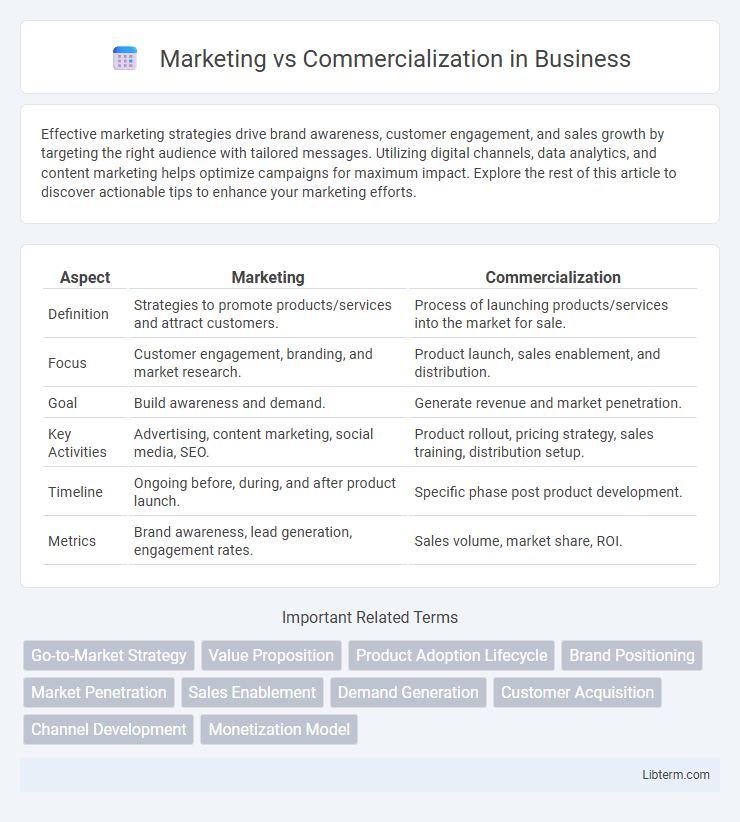Effective marketing strategies drive brand awareness, customer engagement, and sales growth by targeting the right audience with tailored messages. Utilizing digital channels, data analytics, and content marketing helps optimize campaigns for maximum impact. Explore the rest of this article to discover actionable tips to enhance your marketing efforts.
Table of Comparison
| Aspect | Marketing | Commercialization |
|---|---|---|
| Definition | Strategies to promote products/services and attract customers. | Process of launching products/services into the market for sale. |
| Focus | Customer engagement, branding, and market research. | Product launch, sales enablement, and distribution. |
| Goal | Build awareness and demand. | Generate revenue and market penetration. |
| Key Activities | Advertising, content marketing, social media, SEO. | Product rollout, pricing strategy, sales training, distribution setup. |
| Timeline | Ongoing before, during, and after product launch. | Specific phase post product development. |
| Metrics | Brand awareness, lead generation, engagement rates. | Sales volume, market share, ROI. |
Understanding Marketing and Commercialization
Marketing involves researching customer needs, creating targeted strategies, and promoting products to build brand awareness and drive demand. Commercialization focuses on the process of launching a product into the market, including production scaling, distribution, sales optimization, and after-sales support. Understanding the distinction helps businesses effectively align their efforts to maximize market penetration and revenue generation.
Key Differences Between Marketing and Commercialization
Marketing involves strategies and activities aimed at promoting and selling products or services by understanding customer needs and market trends. Commercialization refers to the process of bringing a product or service to the market, including finalizing production, distribution, and sales channels. Key differences include marketing's focus on market research, branding, and customer engagement, while commercialization emphasizes product launch, scaling operations, and revenue generation.
The Role of Marketing in Business Success
Marketing drives business success by identifying customer needs and creating targeted strategies to fulfill them, thus boosting brand awareness and customer engagement. It encompasses market research, product positioning, and promotional activities that differentiate a company from competitors and attract loyal clients. Effective marketing lays the groundwork for successful commercialization by ensuring products reach the right audience with compelling value propositions.
Commercialization: Definition and Importance
Commercialization refers to the process of bringing a new product or service to the market, encompassing activities like production, distribution, sales, and customer support to ensure market entry and revenue generation. It involves transforming an innovation or idea into a viable business offering that meets market demands, thereby driving company growth and competitive advantage. Effective commercialization is crucial for maximizing return on investment (ROI), accelerating product adoption, and establishing a strong market presence.
Stages of the Commercialization Process
The commercialization process involves stages such as idea screening, product development, market testing, and product launch, each crucial for transforming innovations into market-ready products. Marketing plays a role throughout by conducting market research, targeting customer segments, and crafting promotional strategies to drive adoption and sales. Efficient coordination between commercialization stages and marketing activities ensures alignment with market demands and maximizes commercial success.
Marketing Strategies for Effective Commercialization
Marketing strategies for effective commercialization prioritize comprehensive market research, customer segmentation, and targeted communication channels to maximize product adoption and revenue generation. Emphasizing value proposition, competitive differentiation, and integrated marketing campaigns ensures alignment with customer needs and market trends, accelerating commercialization success. Leveraging digital marketing, influencer partnerships, and data-driven analytics further enhances market penetration and brand positioning throughout the commercialization process.
Challenges in Marketing vs. Commercialization
Marketing faces challenges such as identifying target audiences, creating compelling messaging, and maintaining brand consistency across channels. Commercialization struggles involve scaling production, managing supply chains, and navigating regulatory approvals to bring products to market efficiently. Both require strategic alignment to ensure market demand meets operational capabilities.
Case Studies: Marketing vs. Commercialization Outcomes
Case studies comparing marketing versus commercialization reveal distinct outcome patterns where marketing efforts primarily drive brand awareness and customer engagement, while commercialization focuses on product launch success and revenue generation. For instance, Apple's marketing campaigns build anticipation and shape consumer perception, but its commercialization strategy ensures efficient supply chain management and market penetration. Research shows firms investing in both marketing and commercialization phases achieve higher customer retention and sustained profitability.
Measuring Success: KPIs for Marketing and Commercialization
Measuring success in marketing involves KPIs such as Customer Acquisition Cost (CAC), Return on Marketing Investment (ROMI), conversion rates, and brand engagement metrics to evaluate campaign effectiveness and audience reach. Commercialization success is tracked using KPIs like time-to-market, revenue growth, market penetration rate, and profitability margins to assess product launch impact and overall business performance. Both sets of KPIs provide critical insights but focus on different stages--marketing targets customer engagement and lead generation, while commercialization emphasizes market adoption and financial outcomes.
Future Trends in Marketing and Commercialization
Future trends in marketing emphasize personalized customer experiences powered by AI and big data analytics to optimize targeting and engagement. Commercialization will increasingly integrate digital platforms and e-commerce technologies to streamline product launches and accelerate market entry. The convergence of immersive technologies like AR/VR and sustainability-driven consumer preferences will shape both marketing strategies and commercialization processes moving forward.
Marketing Infographic

 libterm.com
libterm.com